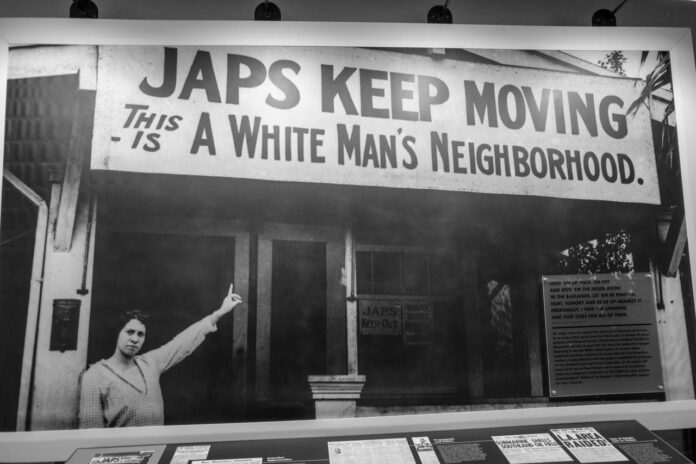
By Joe W. Bowers Jr., California Black Media
In August, the California Attorney General’s Office, publicly apologized for its role in the unjust incarceration of Japanese Americans during World War II. This belated acknowledgement highlights America’s capacity for prejudice and injustice.
Attorney General Rob Bonta’s apology, issued on the 35th anniversary of the Civil Liberties Act of 1988, recognized that his office had used legal tools to deprive a generation of Japanese Californians of their liberty and financial security.
The Civil Liberties Act of 1988, signed by Pres. Ronald Reagan, not only authorized compensation for wrongfully interned Japanese Americans but also included a formal presidential apology and established a public education fund to prevent similar injustices from recurring.
Retired Assemblymember Mariko Yamada, who represented the 4th District and whose family experienced internment, praised Bonta’s action, stating, “I applaud Rob Bonta for acknowledging the past complicity of the Office of CA Attorney General in the wartime Japanese American incarceration and its associated land grabs. It’s never too late to correct an injustice–words matter, and courageous actions mean even more.”
Bonta acknowledged that more work is needed to address the legacy of Japanese American internment and stressed the importance of treating all Californians equally. In his apology, he referred to the nationwide surge in anti-Asian hate crimes and the ongoing struggle for racial justice, invoking the Rev. Martin Luther King, Jr’s words, “A time comes when silence is betrayal,” as a call against complacency in the face of injustice.
The historical injustices faced by Japanese Americans and Black Californians, while by no means equivalent, share undeniable parallels. Both communities have endured systemic discrimination, economic marginalization, and the inescapable trauma of racial violence, leaving lasting scars on individuals and families.
However, when asked about extending a similar apology to Black Californians for the enduring harms of slavery and its ongoing societal impacts, Bonta’s office did not directly respond, sparking the need for further dialogue.
Although Bonta’s apology is a noteworthy step forward, a critical question lingers: Why has a similar recognition and apology not been extended to Black Californians?
Yamada pointed out to California Black Media (CBM) that the Japanese American Citizens League (JACL) recognized the need for government recognition and reparations for the Black community in their Juneteenth 2023 statement, marking the anniversary of the Civil Liberties Act of 1988.
JACL stated “In fact this year, even as we remember 35 years ago the successful fight for redress for the Japanese American community, we recognize another 35 years passing without recognition from our government for the need to provide Black reparations.”
Don Tamaki, a Bay Area-based attorney with a history of working for redress and reparations for Japanese Americans, was the only non-Black member of the nine member California Reparations task force. He recognizes the long history of solidarity across the movements and shared with CBM his view of the unique and extensive 400-year struggle endured by Black Americans.
Tamaki suggests that the reason Japanese Americans have received an apology, while Black Californians have yet to be acknowledged, is rooted in the country’s deep-seated anti-Black bias and a long history of denying Black Americans’ humanity and experiences.
Tamaki’s personal connection to the internment issue offers valuable insights for advocating for a state apology. His parents were recipients of compensation and a formal apology from the federal government. He recalls the awakening of Japanese Americans in the 1960s, influenced by the Civil Rights Movement and King’s televised demonstrations against racial injustice. Tamaki underscores that the Japanese American redress movement, inspired by these events, was aided by Black legislators and activists.
As we welcome steps toward accountability by the Attorney General’s office in the case of Japanese American internment, we also urge the state to apply similar principles of acknowledgment and justice across all communities.
Recently, Tamaki along with five members of the California Reparations Task Force – Dr. Cheryl Grills, Lisa Holder, Dr. Jovan Scott Lewis, Assemblymember Reggie Jones-Sawyer (D-Los Angeles), and Sen. Steven Bradford (D-Inglewood) and the California Black Power Network and the Equal Justice Society announced the formation of the Alliance for Reparations, Reconciliation, and Truth.
The Alliance aims to expand support for reparations for eligible Black Californians by diversifying its allies across different races and sectors. Their strategy involves educating the public about reparations and advocating for the Reparations Task Force’s recommendations.
Alliance leaders have suggested a joint effort with the California Legislative Black Caucus (CLBC) to advance legislation based on these recommendations.
Bradford, the CLBC vice chair, indicated that while the caucus hasn’t yet set legislative priorities for implementing the Task Force’s recommendations, an apology for the legacy of slavery could be a key proposal. He suggested that an apology should be a central focus, stating, “If you were to ask me, an apology has to be front and center.”
In 2008, the U.S. House of Representatives passed a non-binding resolution, apologizing to Black Americans for slavery and for subsequent legal segregation and discrimination. Despite this, neither Congress nor the White House has taken substantial action to redress these historical injustices.
Tamaki, along with Grills and Holder, have been organizing philanthropic support for reparations and have secured endorsements from over 470 organizations and businesses. They aim to reach 1,000 endorsements by the end of 2023.
Recognizing the ongoing and cumulative harms experienced by African Americans is an essential part California’s journey towards justice.
The call for a state apology to its Black residents for historical injustices is more than a plea for words; it’s a call for actions that rectify past wrongs and lay the groundwork for a more equitable California.
About the Author
Joe W. Bowers Jr. is a contributing editor to California Black Media. He is a graduate of Stanford University.
This California Black Media report was supported in whole or in part by funding provided by the State of California, administered by the California State Library.”



